Click image for BBB rating
See our Privacy Policy
cool="cool" width="785" height="9841" border="0" cellpadding="0" cellspacing="0" gridx="16" showgridx="showgridx" usegridx="usegridx" gridy="16" showgridy="showgridy" usegridy="usegridy" bgcolor="#99ccff">
|
 |
|
|
|
|
|
|
Welcome to Spaightwood Galleries, Inc.
120 Main Street, Upton MA 01568-6193
You can follow us on Facebook and Twitter!
We blog regularly on Facebook and announce special events and special sales on both sites.
Dutch Old Master Drawings
|
|
|
|
This show was prompted by our acquisition over the past ten years of a number of old master drawings, including works by Netherlandish artists like Bernaert van Orley, Maarten de Vos, Jan Baptiste de Wael, Abraham Bloemaert, Peter Paul Rubens, Philipp Sadeler, and Nicolaes Maes; Italian artists like Raphael, Parmigianino, Marcantonio Raimondi, Giulio Romano, Perino del Vaga, Andrea Schiavone, Veronese, Federico Zuccaro, Luca Cambiaso, Alessandro Casolani, Matteo Rosselli, Annibale Carracci, Domenichino, and Simone Cantarini, Francesco Albani, Guercino, Pier Francesco Mola, Francesco Vanni, Odoardo Fialetti, Ercole Bazzicaluva, Baldassare Franceschini, Giovanni Battista Vanni, Antonio Busca, Giovanni Lanfranco, Giuseppe Maria Cresspi; German artists like Virgil Solis, Hans von Aachen, and Johann Heinrich Roos; and French artists like Charles de la Fosse, Etienne Parrocel "Le Romain," François Boucher, Jean-François de Neufforge, Mouricault. Some of these works appear to be finished drawings, others attempts to conceptualize an artistic problem to be solved, still others appear to be models for members of the master's workshop to execute in whole or in part under the master's supervision, and many drawings by contemporary artists of etchings or engravings they wished to study or use in their own works (including works after Michelangelo, Titian, Tintoretto, Veronese, Palma Il Giovane, Agostino Carracci, Hendrik Goltzius, Rembrandt, among others). In addition to artists to whom we can authorship or attribute works, we have a number of works to which we can more or less confiently attribute only memebrship in a regional or national school, of which we have a number of examples of the Venetian (16th century), Genoese (17th century), and Bolognese Schools (17th century). Some of these drawings are stunningly beautiful finished works, some are quick sketches, and some are useful for studying how earlier collectors assembled their collections. We have found the study of these possibilities instructive towards our considerations of the art and practise of drawing and their relationship to both the paintings and the prints of the era.
|
|
|
|
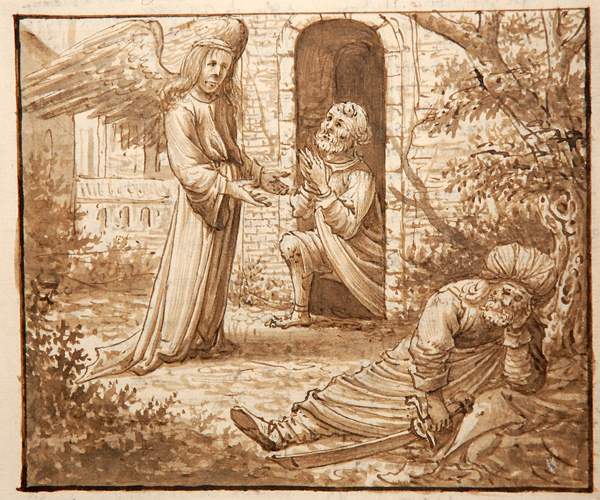 |
|
|
|
Dutch School (late 15th-early 16th century, St. Peter freed from chains by an angel. Pen and wash. This is a leaf from a manuscript book of Saints' Lives (possibly the Legenda Aurea or Golden Legend) commissioned by someone conservative enough not to trust such newfangled inventions as printing presses (clearly they will never last), wealthy enough to pay for a hand-made written and illustrated book, and desirous of something inspirational: the two leaves we have both feature sinners rescued by divine intervention. Image size: 120x143mm. Price: Please call or email for current pricing information.
|
|
|
|
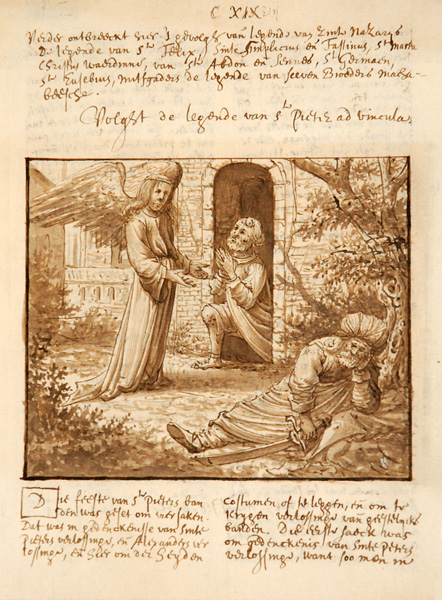 |
|
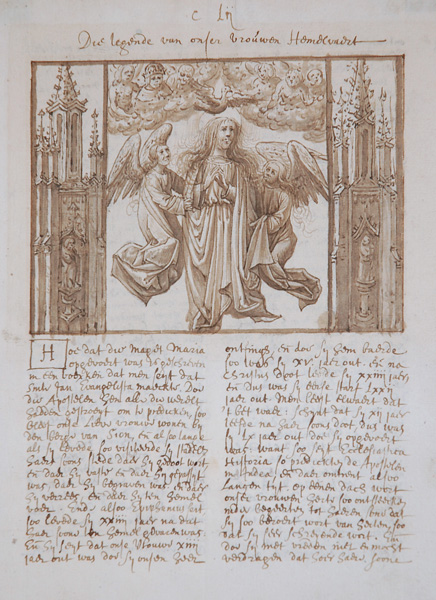 |
|
|
|
Dutch School (late 15th-early 16th century, Mary Magdalen raised to heaven by angels. Pen and wash. This is a leaf from a manuscript book of Saints' Lives (possibly the Legenda Aurea or Golden Legend) commissioned by someone conservative enough not to trust such newfangled inventions as printing presses (clearly they will never last), wealthy enough to pay for a hand-made written and illustrated book, and desirous of something inspirational: the two leaves we have both feature sinners rescued by divine intervention. Image size:120x143mm. Price: Please call or email for current pricing information.
|
|
|
Dutch School (late 15th-early 16th century, St. Peter freed from chains by an angel. Pen and wash. This is a leaf from a manuscript book of Saints' Lives (possibly the Legenda Aurea or Golden Legend) commissioned by someone conservative enough not to trust such newfangled inventions as printing presses (clearly they will never last), wealthy enough to pay for a hand-made written and illustrated book, and desirous of something inspirational: the two leaves we have both feature sinners rescued by divine intervention. Image size:120x143mm. Price: Please call or email for current pricing information.
|
|
|
|
|
|
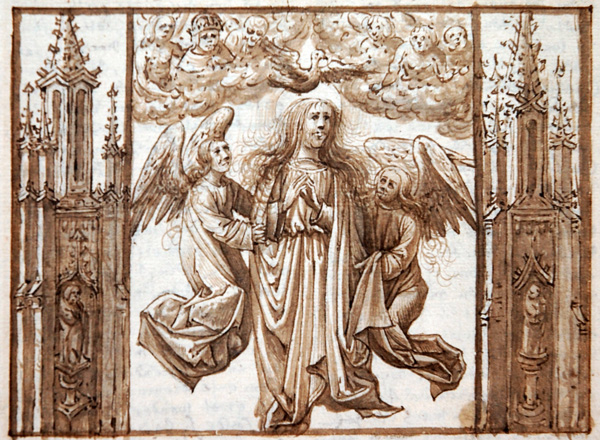 |
|
|
|
Dutch School (late 15th-early 16th century, Mary Magdalen raised to heaven by angels. Pen and wash. This is a leaf from a manuscript book of Saints' Lives (possibly the Legenda Aurea or Golden Legend) commissioned by someone conservative enough not to trust such newfangled inventions as printing presses (clearly they will never last), wealthy enough to pay for a hand-made written and illustrated book, and desirous of something inspirational: the two leaves we have both feature sinners rescued by divine intervention. According to the Golden Legend, After "St. Mary Magdalen" had moved to France and by preaching had prepared the citizens of Marseilles and Aix to convert to Christianity, "moved by her wish to live in contemplation of the things of God, [she] retired to a mountain cave which the hands of angels had made ready for her, and there she dwelt for thirty years. . . . There she found neither water nor herb nor tree, whereby she knew that Jesus wished to sustain her with naught but heavenly meats, allowing her no earthly satisfaction. But every day the angels bore her aloft at the seven canonical hours, and with her bodily ears she heard the glorious chants of the heavenly hosts. Then, being filled with this delightful repast, she came down to her grotto, and needed no bodily food" The Golden Legend of Jacobus de Voraigne, trans. and adapted Granger Ryan and Helmut Ripperger (NY: Arno Press, 1969, pp. 360-61). Image size:120x143mm. Price: Please call or email for current pricing information.
|
|
|
|
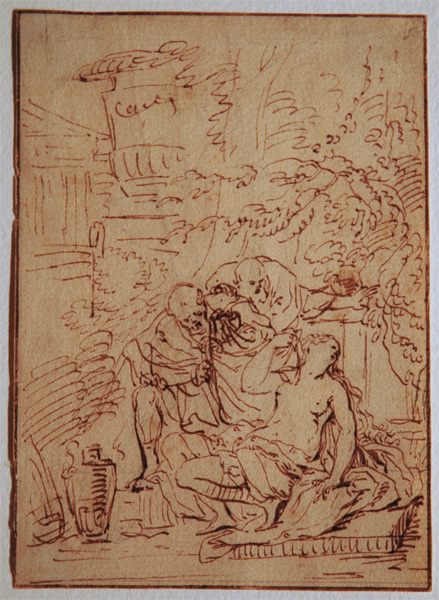 |
|
|
|
Bernaert van Orley (Netherlandish, 1492-1542), Susannah and the elders. Pen and sepia ink drawing on laid paper without a watermark, c. 1530. Van Orley is an important Netherlandish master whose works are in the collections of most major national museums, including the National Gallery of Art in both Washington and London, the Louvre, the Metroplitan Museum of Art, and the Worcester MA Art Museum. He went to Rome with the Dutch Pope Adrian after the death of Leo X and returned home after the Pope was poisoned. He provided a first-hand witness to the works of the High Renaissance in Rome. Image size: 115x82mm. Price: Please call or email for current pricing information.
|
|
|
|
|
|
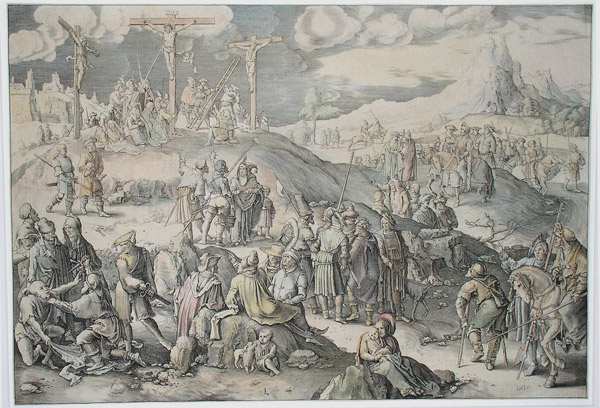 |
|
|
|
Lucas van Leyden (Dutch, 1494-1533), Golgotha (B. 74, L. 99), Original etching with later hand coloring, 1517. One of Lucas' largest prints, here in a very rare and beautiful exemplar. Lucas is considered the finest Netherlandish printmaker of the first half of the 16th century both by his contemporaries and by modern art historian. It is possible that many prints were sold and then handcolored by local artists for people who could not afford a painting. Image size: 276x403mm. Price: Please call or email for current pricing information.
|
|
|
|
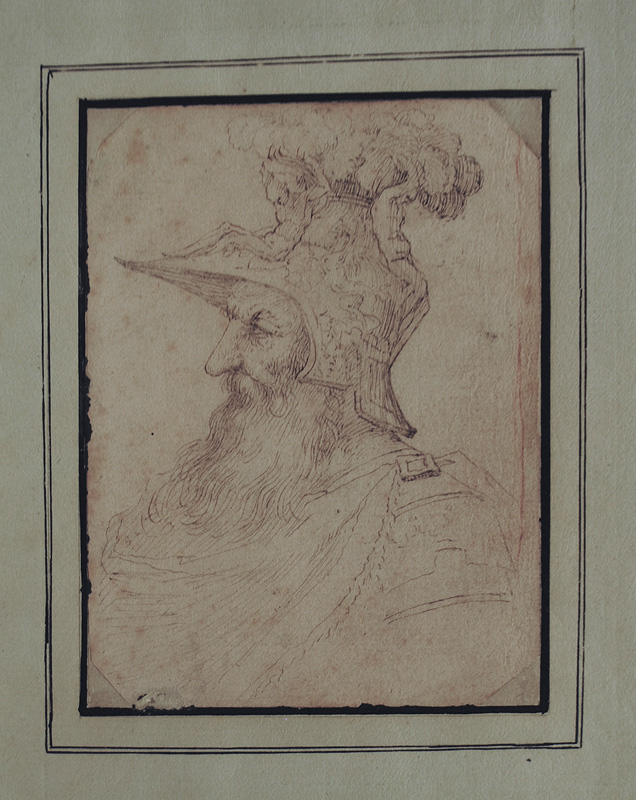 |
|
|
|
Dutch School (later 16th century), Bearded man with fantastic helmet. Pen and brown ink. This drawing features a wonderful Mannerist helmet adorned with two captives holding up the feathers on the crest of the helmet and calls to mind Prince Arthur's helmet, which features a crouching dragon underneath of a crest of "discolored hairs dancing diversely" in Book I of Edmund Spenser's Faerie Queene (1590). Like a series of later etchings by Wenzel Hollar after Parmigianino (see Jacquekine Burgers, Wenceslaus Hollar: Seventeenth-Century Prints from the Museum Boymans-van Beuningen Museum, Rotterdam [Alexandria VA: Art Services International, 1994], plates 97 a-97c), this drawing may have been inspired by an Italian model inspired by descriptions like those in Ariosto's Orlando Furioso; since the Ariosto text itself spawned many literary descendants, it is also popssible that the only model may have been the imagination of the anonymous artist. Laid down on a sheet of tinted laid paper with a high crown watermark and an annotation on the verso: "Coll: Piekostellit Braundegee." Image size: 127x95mm. Price: SOLD.
On my 27" inch monitor, the drawing is about life-size. The real drawing and support sheet, however, are rectangular.
|
|
|
|
 |
|
|
|
Follower of Hendrik Goltzius (Dutch, 1558-1617), Sarah overhearing the angels announce to Abraham that she is going to give birth. Red chalk on thin laid paper. This splendid example of late 16th-century Dutch Mannerist style is a drawing based upon Jacob Matham's engraving after his step-father Hendrik Goltzius' drawing for the series, Wives of the Patriarchs (c. 1590). The drawing is a very close copy of Matham's engraving (B. 248) and was probably made by an artist wanting to preserve the composition for later use. The drawing has been mounted on a leaf for an old collector's album and has ruled decorative borders surrounding the drawing. Image size: 240x165mm. Price: Please call or email for current pricing information.
|
|
|
|
|
|
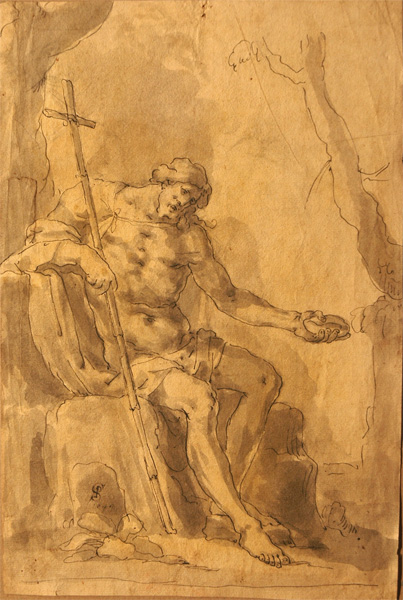 |
|
|
|
Philipp Sadeler (Venice, c. 1600- Passau 1650). John the Baptist. Pen and black ink and brown and gray wash on thin cream laid paper, initialed PS and dated 1644 lower left. Collector's mark (see below): indistinct crowned coat of arms on verso. Philipp was part of the Sadeler Dynasaty of engravers and print publishers during the 16th and 17th centuries. He was the son of Raphael Sadeler I, the nephew of Jan Sadeler, and the cousin of Aegidius Sadeler II, Imperial Printmaker to Emperor Rudolph II. This drawing combines the late 16th-century Dutch Mannerist style with the muscular style of Michelangelo mediated through Tintoretto. Condition: two light pressure marks diagonally across the upper part of the drawing from the top of the cross at left to the tree at right; on the verso, there is a piece of paper about 1-7/8 x 3/4 inch visible only from the verso reinforcing a verrtical tear in the sheet and a 1/8 inch tear from the left margin on up. In short, for a 371-year-old drawing it is in very good condition. Image size: 282/283x190mm. Price: Please call or email for current pricing information.
|
|
|
|
|
|
 |
|
|
|
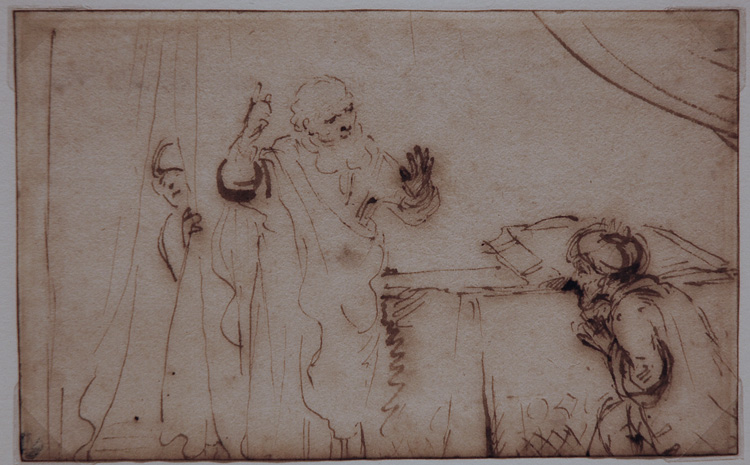 |
|
|
|
Nicolaes Maes (Dordrecht 1634-1693 Amsterdam) , The Prophet Nathan rebukes David. Pen and brown ink and wash on laid paper, c. 1650-1660. From the roof of his palace, David sees Bathsheba engaging in her ritual purification bath at the end of her period. He sends for her, seduces her, and she conceives a child. Her husband Uriah the Hittite, one of David's captains, comes home, but will not sleep with his wife while his comrades are in battle, so David orders Joab to set up a way of getting him killed in battle. David then marries Bathsheba. The situation depicted in this drawing is described in 2 Samuel 1-15. God sends the Prophet Nathan to call David back to obedience. Nathan tells David a story about a rich man who kills his neighbor's only lamb to feast a traveller even though he is rich and his many sheep of his own. David condemns the rich man to death only to have Nathan tell him, "You are the man! Thus says the LORD, the God of Israel: I anointed you king over Israel, and I rescued you from the hand of Saul; I gave you your master’s house, and your master’s wives into your bosom, and gave you the house of Israel and of Judah; and if that had been too little, I would have added as much more. Why have you despised the word of the LORD, to do what is evil in his sight? You have struck down Uriah the Hittite with the sword, and have taken his wife to be your wife, and have killed him with the sword of the Ammonites" (7-9). Maes has illustrated the moment when David cowers in fear of the Lord's wrath and repents. This drawing is illustrated in Walter Sumowski's Drawings of the Rembrandt School, 10 vols. (NY: Abaris Books, 1979-1992), vol. 8, p. 4298-99, catalogue n. 1922x. It has also been published in William W. Robinson, Rembrandt's Sketches of Historical Subjects (1987), p. 256, fig. 22. Maes apprenticed with Rembrandt from about 1648 to 1654, where he focused first on genre paintings and then on portraits. This drawing was probably done while he was in Rembrandt's studio or shortly after leaving it to return to Dordrecht and set himself up as a master. As Marian Bisanz-Prakken says in Rembrandt and His Time: Masterworks from the Albertina, Vienna (NY: Hudson Hills Press, 2005), "In Maes's studies of biblical and mythological scenes, which are mostly executed in pen, sometimes in combination with the brush, Rembrandt's influence is clearly evident. . . . In these representations, the typological rather than the portrait aspect comes predominantly to the fore" (p. 108). Robinson's entry in the Art Dictionary (20: 78-81) argues that "Though indebted to Rembrandt's example, the early religious works exhibit a precocious originality in the interpretation of the sacred text and iconographic tradition" (78). Williams further suggests that "for a brief period in the mid-1650s—the most likely date for our drawing—Maes ranked among the most innovative Dutch genre painters, owing to his talent for pictorial invention and for devising expressive poses, gestures, and physiognomies." According to Williams, Maes left about 160 drawings, allowing us to study his practice as a draftsman: "The figure studies also exhibit a wide variety of media and techniques. They range from spare contours delineated with pen or brush to exquisitely refined studies in red chalk . . . to broadly pictorial drawings executed in a comination of chalk, ink, wash, and body color" (20: 80). Image size: 102x160mm. Price: Please call or email for current pricing information.
|
|
|
|
|
|
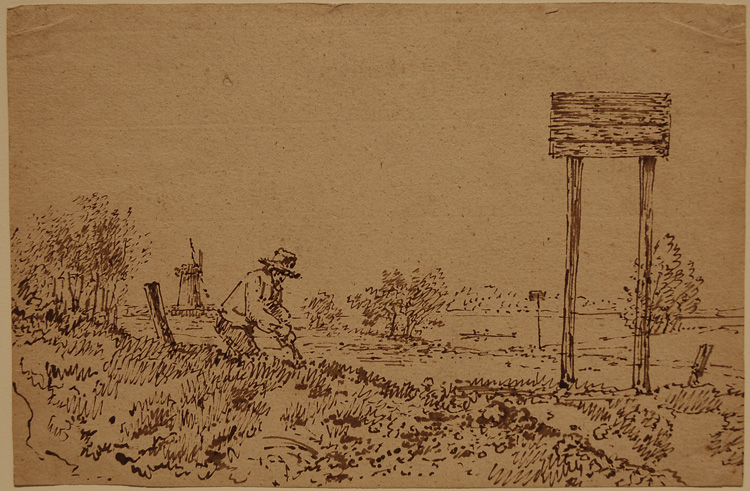 |
|
|
|
Rembrandt School (mid-17th century, Landscape with farmworker, windmill in the background. Pen and brown ink on laid paper, c. 1660. A very similar piece is shown in Drawings of the Rembrandt School, vol. 10, p. 5458, where it is attributed to Pieter de With, a painter and etcher active during the 1660s. Its similarites to a number of drawings by Rembrandt (e.g. Slive, Dover edition, numbers 62, 63, 73, 80, 126-27, 477, and 515, are apparent. Image size:159x242mm. Price: Please call or email for current pricing information.
|
|
|
|
|
|
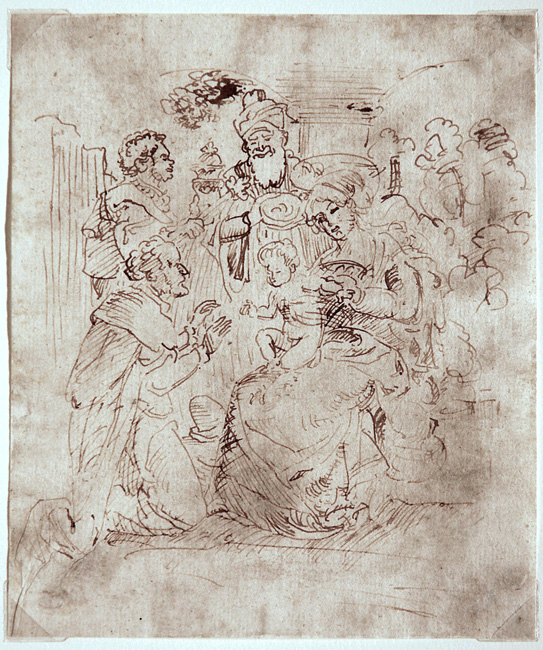 |
|
|
|
Rembrandt School (mid-17th century), The Adoration of the Magi. Pen and brown ink and brown wash on laid paper, c. 1660. This drawing is the product of someone familiar with Rembrandt's loose fine-point pen drawings (see, e.g., Seymour Slive, Drawings of Rembrandt, numbers 3, 18, 27, 77, & 224). Partial watermark similar to Large City Gate. Overall appearance: very good. Image size: 172x146mm. Price: Please call or email for current pricing information.
|
|
|
|
|
|
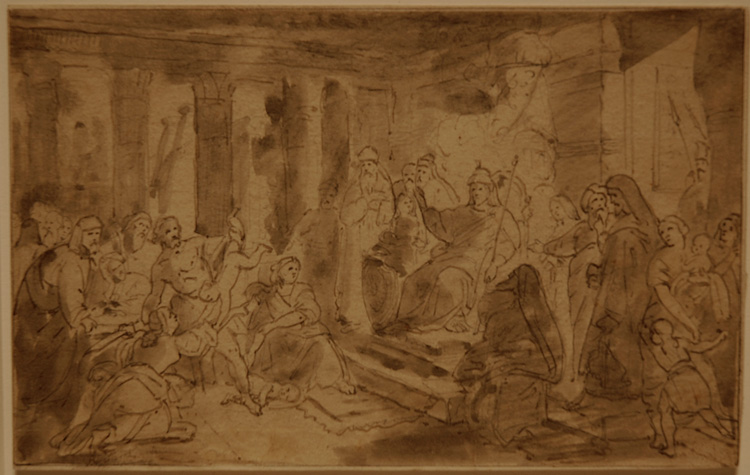 |
|
|
|
Dutch School (17th century), The Judgment of Solomon. Pen and black ink and gray wash and pencil on laid paper. This drawing illustrates the first test of the wisdom God granted to Solomon (I kings 3: 5-28) as Solomon finds a way to discover which of the two women's claims to be the mother of a child are true. God's grant of wisdon to rulers seems to be especially significant in Protestant countries during The Thirty Years' War which led to the creation of the Dutch Republic and a period of cold war with its Catholic neighbors and it's former Spanish rulers. Image size:112x177mm. Price: Please call or email for current pricing information.
|
|
|
|
|
|
Spaightwood Galleries, Inc.
To purchase, call us at 1-800-809-3343 (1-508-529-2511 in Upton MA & vicinity) or send an email to spaightwood@gmail.com
We accept AmericanExpress, DiscoverCard, MasterCard, and Visa.
We also accept wire transfers and paypal.
For directions and visiting information, please call. We are, of course, always available over the web and by telephone (see above for contact information). Click the following for links to past shows and artists. For a visual tour of the gallery, please click here. For information about Andy Weiner and Sonja Hansard-Weiner, please click here. For a list of special offers currently available, see Specials.
All works are sold with an unconditional guarantee of authenticity (as described in our website listing).
Go back to the top of this page.
Visiting hours: Saturday 10:00 am to 5:00 pm and Sunday noon to 6:00 pm and other times by arrangement.
Please call to confirm your visit. Browsers and guests are welcome.
|
|
|
|
|
|
|
|
|
|
|
|
|
|
|
|
|
|
|
|
|
|
|
|
|
|
|
|
|
|
|
|
|
|
|
|
|
|
|
|
|
|
|
|
|
|
|
|
|
|
|
|
|
|













